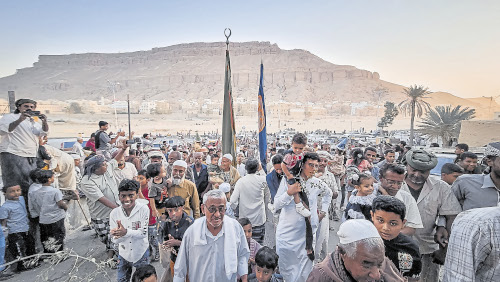The fragile peace process in Yemen, which has reduced violence in the country enormously over the last two years, is under pressure. The UN secretary-general’s special envoy to Yemen, Hans Grundberg, told the UN security council on 14 February: ‘Rising regional tensions linked to the war in Gaza, and in particular the military escalation in the Red Sea, are slowing down the pace of the peace efforts in Yemen.’
The US is risking a major plank of the peace process by listing the Houthis (who rule two-thirds of the Yemeni people) as terrorists and imposing financial sanctions.
Adnan Hashem, a researcher at the Yemen and Gulf Center for Studies (in Aden, Yemen) told Al Jazeera that the financial sanctions will not impact the Houthis: ‘All that the Houthis own is inside Yemen, and they do not have cash or properties outside Yemen.’
Hashem said that labelling the Houthis as ‘terrorists’ could lead them to ‘feel humiliated’ and escalate their attacks on commercial shipping.
The Houthis, or ‘Ansar Allah’ (‘Supporters of God’), have been attacking Red Sea shipping since November in order, they say, to pressure Israel to allow food and medicine into Gaza. In response, the US and UK have been attacking Houthi positions.
‘The escalation in the Red Sea has resulted in the direct suspension of a deal that was anticipated to be announced in recent months,’ Ahmed Nagi, a senior Yemen analyst at the International Crisis Group, told the New York Times on 5 February.
That peace deal is desperately-needed, as six million people in Yemen are just one step away from famine, according to the UN: ‘The risk of a large-scale famine in the country has never been more acute.’
The war really began with Saudi Arabia’s military intervention in March 2015.
The peace deal the UN has been helping to negotiate has been between the Houthis and the Saudis (without taking account of the interests of anti-Houthi groups in Yemen).
There have been warm words between the Houthis and the Saudis. On 9 February, Houthi chief negotiator Mohammed Abdulsalam told a Saudi newspaper, Arab News, that a recent meeting with Saudi officials had ‘resulted in overcoming the most important obstacles facing the [UN-brokered] roadmap’ to peace.
However, a member of the Houthi political bureau, Ali al-Qahoom, later told a Lebanese TV news channel that the Saudis were now ‘somewhat procrastinating’ because, he believed, the US was pressuring Saudi Arabia not to make peace.
Return to war?
Meanwhile, the two major anti-Houthi groupings in Yemen have been pressing for an end to the semi-truce and a return to war.
Rashad al-Alimi, head of Yemen’s internationally-recognized government (a Saudi client), has called for a new ground offensive against Ansar Allah in coastal areas: ‘These regions must be liberated from Houthi control.’
A senior official with the other major anti-Houthi force, the southern transitional council (a client of the United Arab Emirates), criticised the ‘road map’ as a Saudi-led plan.
Amr Al Bidh said: ‘We have to first stop the road map, and then let’s think seriously about doing something on land,’ meaning a new ground war against the Houthis.
The US escalated the Red Sea conflict by relisting Ansar Allah as ‘specially designated global terrorists’ (SDGT), meaning the disruption of financial flows between Yemen and other countries, which may harm commercial trade, humanitarian operations, and money sent home from Yemenis abroad.
One key part of the UN roadmap to peace is organising salary payments for public sector workers in Houthi-controlled territories who haven’t seen any pay for many years. This payment will not be possible because of the SDGT label.
A US source told the New York Times: ‘Officials could issue an additional license that would facilitate the payment of the salaries if the Houthis pursue the path of peace’ (emphasis added).
In other words, the US is putting the Yemeni peace process at risk, and withholding urgently-needed back pay from a million public sector workers in Houthi areas – when they could achieve the same protection for Red Sea shipping by forcing Israel to obey the world court by stopping its attacks in Gaza and ‘enabling’ enough food, medicine and other critical supplies into the territory.


